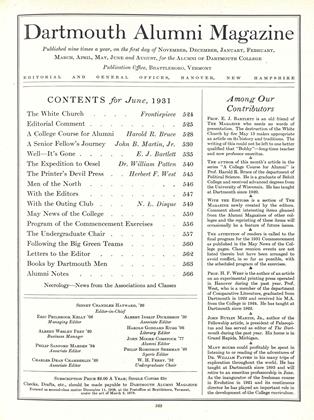Greek and Latin have long had to compete with the modern languages, the sciences, and even vocational and pre-vocational subjects. The State universities have not required Greek or Latin for admission, not even for the A.B. degree. There are colleges of liberal arts that still cling to them, but even they are not so insistent as they once were. Last year Princeton ceased to require either of the ancient languages for admission or graduation. And now New England, that has been as strong for the classics as for protection in industry, finds its defenses weakened by the surrender on the Yale front. Such colleges as Amherst, Bowdoin and Williams still maintain their classical standards. Harvard remains the last great university stronghold of them.
All this should put classicists on their mettle to demonstrate the superiority of their discipline in the cultivation of the mind in clear thinking and accurate speaking and writing. It will be an unhappy day for culture when such an address as was made by Professor Frank Gardner Moore of the Department of Latin in Columbia University a few days ago in tribute to Professor Edward Delavan Perry of the Greek Department, retiring with honor after fifty years of teaching can no longer be generally read by American graduates. The following extract indicates its delightful flavor as well as the quality of the man to whom it was addressed: At semper fluvius Borealis te revocavit, Velivolis undis litora nostra lavans, Lampadibusque Novum Stellas caecans Eboracum Omnes, obtundens multisonisque viis. Quamquam Academiae tranquilla silentia nostrae Semper defuerunt, umbrifera atque loca, Inter fumum at opes, strepitum inter at altius urbis Surgentes speculas culminaque aerea, Hie tamen impavidus artes Graecas docuisti Innumeros iuvenes lustra per ista decern.
It is to be hoped that at least a few will continue to find such instruction as this great teacher has given for a half century in the arts of Greece and as interpreter of language and the gods of Olympus.
—The New York Times—May 13.
Probably "a few" still profit from the study of Hebrew. Certainly the quotation above is not and has not been "generally read by American graduates" of the last twenty years.
 View Full Issue
View Full Issue
More From This Issue
-
 Class Notes
Class NotesCLASS OF 1930
June 1931 By Albert I. Dickerson -
 Article
ArticleA Senior Fellow's Journey
June 1931 By John Butlin Martin, Jr. -
 Class Notes
Class NotesCLASS OF 1929
June 1931 By F. W. Andres -
 Article
ArticleThe Dartmouth Expedition to the Island of Oesel
June 1931 By Wm. Patten -
 Class Notes
Class NotesCLASS OF 1910
June 1931 -
 Lettter from the Editor
Lettter from the EditorEditorial Comment
June 1931








